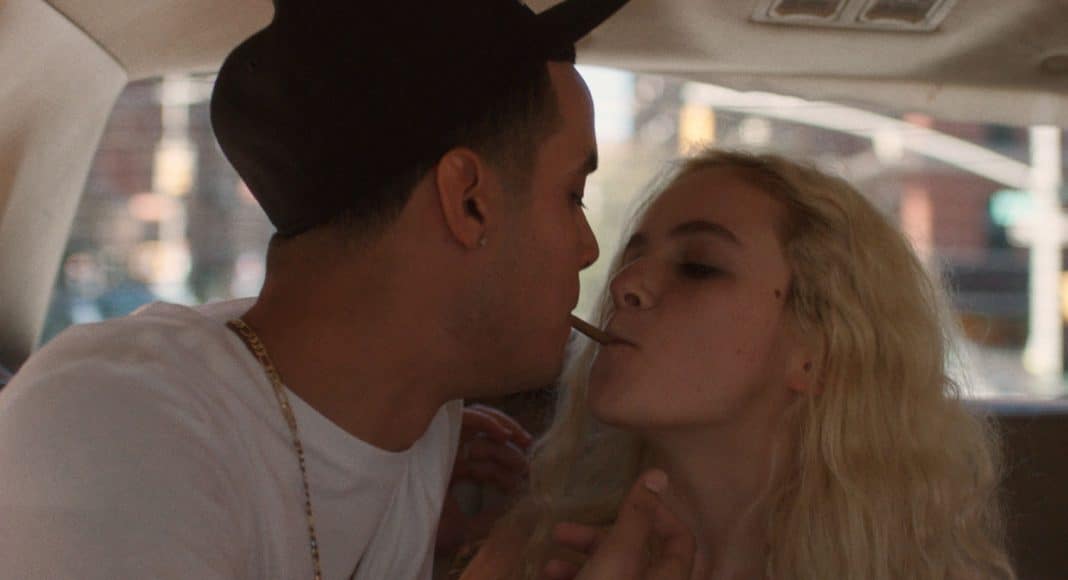Many films that critics label “exploitative” don’t go far enough. Such was the case with Harmony Korine’s Spring Breakers, a Skrillex-induced fever dream about three girls willing to chase their next high wherever it may lead them, even if that meant James Franco’s cornrows. It was also fetishizing a kind of privileged millennial fun—excessive, wistfully ignorant, lots of bong hits, and guarded, knowing a safety net might catch them wherever they fall. Near the end, when two girls don cloth masks to raid drug dealers, you get the meta-joke. Playing pretend, they are.
But before that, those girls see off their other friend, Selena Gomez’s Faith, and without her, also see off a more interesting movie. It turns camp, those girls killing black gangsters—including rapper Gucci Mane, of all people—and while still a fun ride, loses its previous vérité thrill. It reminds you a fact you almost forgot: you’re watching a movie with a road map, not the boundless quasi-documentary it portrays in the beginning.
None of those lapses appear in Elizabeth Wood’s new White Girl, her debut feature. It’s been called the millennial Kids, another “exploitative” Kormine film (his first screenplay), and it’s an apt comparison.
The movie follows Leah, a white girl who moves to Bridgewood, Queens, one summer as she prepares to attend Hunter College. But school barely registers as important; we never see her in class. She has no objective other than finding fun. When the magazine editor at her internship asks of her future plans, you can tell it’s the first time she’s even considered that prospective. Leah replies that she wants some job “in media,” and she seems proud of her answer.
Practically giddy, she asks to score some weed, like it was some game.
The film’s primary concern lies in its title; examining the privilege of being a white girl. When Leah approaches the Puerto Rican drug dealers on her block, it dances within her attitude. Practically giddy, she asks to score some weed, like it was some game. Soon enough she engages in a relationship with “Blue”—sex against the wall of her apartment’s rooftop, sex while riding in a cab, sex in the bathroom. While Blue repeats his genuine affection toward Leah, it’s not hard guessing what she’s in it for.
Blissfully unaware of the implications, Leah invites her new drug dealer boyfriend and his buddies to a Manhattan media party, where they can sell product at a marked-up price to yuppies. Wood makes watching these classes abut one another subversively uncomfortable; for the heights their shared hedonism reaches, a smug entitlement wafts through the white Manhattanites. This is their world, and they’re allowing these people of color to visit and only because they possess something they want: a white girl and that white, girl. Afterwards, they’ll return where they came from. All the while, Leah chooses willful ignorance that any of this is happening.
But a girl like that, vengefully pursuing her musings, is intoxicating. Whatever ongoing party she’s having, you want in. Morgan Saylor, who plays Leah, draws you in. She’s absolutely explosive in the film. Her face is like a rubber band: limp, slack when she’s unaroused, but liable to snap when that toothy smile stretches her face. Her movements flutter with provocation, every conversation she has full of flirtatious purring. She embodies that sought-after free spirit ideal, but it’s tinged with an awareness. She can only act this way—and like those Spring Breakers, it assuredly is an act—because she knows as dark and depraved as things may seem, this world she’s in protects white girls. Why? Because it desires them so.
But this shield crumbles once she becomes a serious player in the underworld she previously just visited. Boyfriend Blue gets set up and arrested, leaving Leah in possession of 10 ounces of cocaine. A guilty conscience captures Leah and, to afford Blue a lawyer, begins selling the drugs herself. You fear the film’s about to make a turn for the worse. Will she become the, sigh, white savior? Or will White Girl turn preachy with its politics?
Instead, Wood steers her film into further debauchery. It’s a deft move. She knows that stimulant nerve newcomers feel in New York City. That sense of possibility, that intensity. Reportedly, the movie’s based on Wood’s own experiences, moving from a small town into the city. From the film’s first frame Wood shoots close ups frequently, peering in, where other directors might pull back. Instead it’s about the fun, the faces, and the freedom she desperately doesn’t want to give up. Whatever’s going on around her—where we know the danger lurks—just gets pushed past the edges.
So Leah parties more, she hooks up with other men. She snorts every line, every bump of coke possible. All in a fruitless attempt to chase that feeling. But like all benders, it goes on too long. The fun hollows out, proves depthless. Leah plays too loose and fast, meeting her match in white men, who callously exploit her naivety. She employs her magazine editor to help sell product, but when she gets sick, puking on his shirt during a sexual romp, he just leaves her in a nightclub bathroom. She awakes there, and the money’s gone. When Leah confronts him, he shrugs it off, saying, “It’s only money.”
Much depravity and debauchery spirals out from there. And where does Leah end up? The classroom, finally. But by then, she’s already earned her education. The world has and always will view her as a white girl. Now she knows what that really means.


